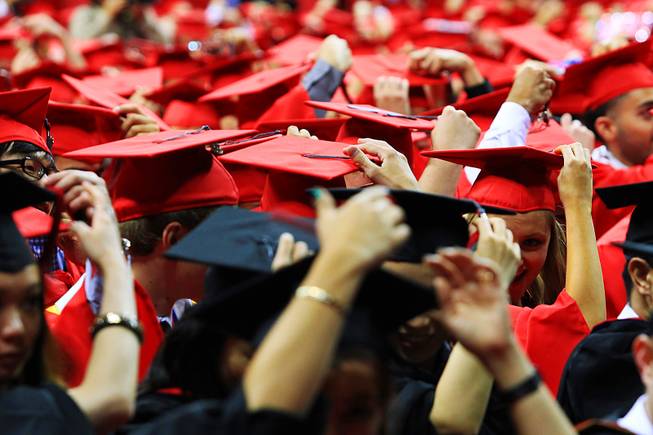Friday, June 6, 2014 | 4:24 p.m.
Nevada’s higher education leaders today approved a four-year plan to raise undergraduate tuition at UNLV by 17 percent.
The 13-member Board of Regents voted 7-6 to pass the tuition hike over student concerns about the skyrocketing cost of higher education.
Starting in fall 2015, UNLV’s tuition will go up about four percent annually for four years. That means by 2018, students will pay $6,720 a year, up from $5,745 a year currently.
Regents argued the increased tuition fees would partially offset state budget cuts to higher education during the Great Recession. Nevada’s higher education funding dropped from a high of $683 million in 2009 to $475 million in 2014. The Silver State’s 22 percent decline in state higher education funding was the third largest nationally.
Regents said the tuition increase would help UNLV hire more faculty and increase student support to prepare more graduates and rebuild the Las Vegas economy.
Chancellor Dan Klaich said that despite the tuition hike, UNLV remains one of the more affordable colleges in the country. Among 16 Western universities, Nevada ranks 10th most expensive, cheaper than public colleges in North and South Dakota.
However, students argued that UNLV’s annual tuition has nearly tripled in the past decade, from $2,370 in 2002 to $5,745 in 2012. Today’s decision marks the 12th tuition increase since 2002.
Student government leaders from Las Vegas, five of whom traveled more than 400 miles to address the regents in person, expressed disappointment that regents decided to vote on the proposal over the summer when most students are out of class.
“It made it very difficult for us to voice our opinions and our concerns to regents,” said Elias Benjelloun, UNLV’s undergraduate student body president.
Student leaders objected to how their colleges and universities used previous tuition increases. They accused their institutions of boosting administrator pay and placing the burden of UNLV’s lofty ambitions on students, instead of the state.
“Moving toward a Tier-1 university is a great aspiration, but you can’t do it on the backs of students,” Benjelloun said.
The majority of students at UNLV opposed the tuition increase because it would create a financial hardship and make it more difficult for students to graduate, according to a student government survey earlier this year.
At UNLV, tuition increases have outpaced the rate of inflation, causing more students to graduate in debt. In Nevada, the average college student graduates with nearly $20,000 in loans, which is about $6,000 lower than the national average. Last year, the nation’s student loan debt surpassed $1 trillion — more than the nation’s credit card debt.
Benjelloun, a UNLV senior majoring in pre-medicine, worked at his family’s restaurant and held on-campus research jobs to help pay for college. With rising tuition costs, Benjelloun said he fears his five younger siblings will find a college education more difficult to afford.
“I have five younger siblings who want to go to college,” he said. “I’m worried this (tuition increase) will make it harder for them.”
At Nevada State College, undergraduate fees will rise 2.5 percent in the first year and 3.5 percent for the next three years.
The Associated Press contributed to this report.


Join the Discussion:
Check this out for a full explanation of our conversion to the LiveFyre commenting system and instructions on how to sign up for an account.
Full comments policy